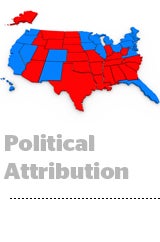 Digital ad experts are rising in the political campaign world, but digital’s unique measurement capabilities aren’t coming with them.
Digital ad experts are rising in the political campaign world, but digital’s unique measurement capabilities aren’t coming with them.
A big part of the problem is that the nature of voting defies measurement.
“On the political side, there’s only one interaction a person takes [i.e., his or her vote], and you don’t know for months after whether they took action or what that decision was,” said Mike Schneider, managing director at the liberal digital media agency Bully Pulpit Interactive.
Attribution metrics like brand lift, in-store sales and bid stream data don’t serve political spenders’ needs.
“Honestly, I don’t think attribution is a word most [political ad-buyer consultants] are even aware of,” said Semcasting CEO Ray Kingman.
Political campaigns “depend on their pollsters or political partners to tell them how their messages are resonating,” said Monica Seebohm, who heads Tremor Video’s political sales group. “They don’t go to a third-party ad tech provider for that.”
None of the most widely used brand attribution companies – AOL’s Convertro, Google’s Attribution 360, Neustar’s MarketShare, Visual IQ and Conversion Logic – have a political customer.
Attribution providers are accustomed to long, messy integrations, but the stop-and-start nature of political campaigning makes it almost impossible to maintain pricey, intensive services. For instance, Google’s white-glove attribution service, Attribution 360 (previously Adometry), spent more than a year working with Dentsu Aegis and General Motors just to set the foundation for an involved measurement relationship.
In the previous election cycle, one prominent Democratic digital ad agency submitted a proposal for an enterprise-class attribution service, but it was rejected by the measurement firm because quick pivots in campaign priorities, fluid metrics and the short duration of campaigns made it impossible to implement, according to Alison Lohse, co-founder of Conversion Logic and an attribution industry veteran.
“Fluid metrics” may seem vague, but that’s just the point. Political campaigns will place ads with no intent other than to drive news cycles, said Chase Campbell, VP of client strategy at the Republican digital agency Harris Media.
If a green energy company opens a new factory or someone with a concealed-carry permit prevents a crime, campaigns would place relevant in-state ads just to piggyback on the positive media attention.
And while pollsters are mostly indifferent to the raw data that comes from the bid stream and digital advertising, they do look at overall spending numbers as a metric for candidate momentum, said Kingman. The result is that high-profile campaigns (presidential and senatorial, mainly) regularly place ad buys just to force their competitors to spend time and money there as well.
While brand-lift surveys can gauge advertising impact, how do you attribute the success of your media mix when the goal was to force an opponent to reschedule events to a district or state he or she was already going to win?
Campbell also said political campaigns use digital to test messages for TV in a way brands don’t. “Smart campaigns will run video or messaging in the summer just to see what messages are strongest with the audiences they plan to hit on TV in the fall.”
Political campaigns get more value from measurement tools that refine the targeting and execution of a TV budget versus tools that assess digital ad performance.
For instance, a significant chunk of Tremor’s pre-convention ad budgets came from political campaigns using digital advertising audiences as focus groups.
“We would send out videos for specific issues – health care, wage equity, gender equality – and they’re just using that to see which audiences click on which videos to learn more, which is a proxy for issue advocacy,” Seebohm said. “They often wouldn’t even care about the viewability or completion rate.”
Almost any brand that spends as aggressively as a typical presidential campaign is going to put a portion of their budget toward test case development, like serving a PSA to a percentage of the targeted audience as a control group for attribution, said Seebohm.
But political buyers tend to place such highly refined, expensive bids (like women in a certain district, within a certain age range, who voted in the previous two party primaries) that they’re unwilling to sacrifice reach or carve out a budget for measurement.
The fruit fly life cycle of political tech is also a huge barrier to continuous attribution. Matt Oczkowski, chief digital officer for Scott Walker’s short-lived presidential campaign and now the head of product at conservative data firm Cambridge Analytica, referred to the software that has gone down with losing campaigns as “the graveyard of Republican IP technology.”
The phenomenon isn’t unique to the right. Eli Kaplan, co-founder of the progressive ad agency Rising Tide Interactive, previously told AdExchanger, “A lot of the things built during the Obama campaign never lived past the campaign. … And now there are groups of people trying to bring that software back, because some sort of disappeared.”
A digital advertising or tech vendor can be brought in mid-swing for a campaign, with very little lead-time, and is judged alongside the candidate on Election Day, said Campbell.
Mercenary forces don’t get attributed partial success for overall failure: They win or they lose.
“I wouldn’t call it attribution,” said Campbell. “It’s more just expectation.”












